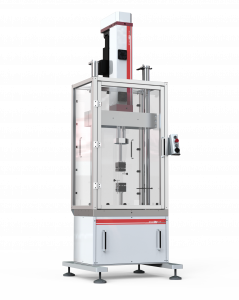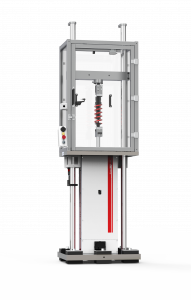What is a Tensile Test?
A tensile test is a fundamental mechanical evaluation conducted on materials, products, or components. It involves applying a force to a material specimen to assess its response to tensile (pulling) stress.
These tests are straightforward to set up and conduct, offering insights into various material characteristics. In a typical tensile test, a sample is subjected to increasing stress until it reaches its breaking point, revealing the material’s ultimate tensile strength. The test records both the applied force and the sample’s elongation throughout. Material properties are commonly quantified in terms of stress and strain.
What is the purpose of Tensile Testing?
Tensile testing is crucial in ensuring that materials meet minimum strength and elongation standards. Tensile tests yield essential data for characterizing material properties. In essence, the primary purpose of tensile testing is to evaluate a material’s mechanical properties, enabling the determination of its suitability for specific applications and its performance under various loads and stresses.
Why Tensile Testing is important?
Tensile testing is fundamental in the research and development process, serving as a tool for selecting suitable materials. This practice is indispensable for manufacturers and researchers across diverse industries, as it is essential to assess a material’s ability to withstand the mechanical stresses it will face in its intended application when considering it for a new product or purpose.
How to perform a Tensile Test?
After seeing what is a tensile test and why it is so important, let’s see how a tensile test is performed:
- Prepare the sample in the dogbone or dumbbell shape and evaluate the specimen’s suitability, grips, and faces for the test’s purpose and specifications.
- Ensure proper alignment between the lower and upper clamps and position the sample.
- Attach an extensometer to monitor changes in the material during testing.
- Initiate the test by gradually separating the tensile clamps, following a controlled speed.
- Analyze the specimen’s behaviour as it undergoes deformation and collects data.
- Calculate tensile strength, yield strength, and ductility after the test.
- Compare the broken specimen with the undamaged duplicate for assessing material strength and durability.
Different types of Tensile Test
There are various types of tensile tests, each designed for specific purposes and materials:
- Uniaxial tensile test: Involve applying a single directional force to assess a material’s tensile strength.
- Biaxial test: Simultaneously apply forces in two directions, evaluating resistance to biaxial stress.
- Triaxial test: Apply forces in three directions concurrently, typically used for anisotropic materials such as rocks.
- Dynamic tensile test: Involve cyclic or time-varying forces to study a material’s behavior under dynamic conditions, like fatigue.
- High or low-temperature tensile test: Assess how temperature affects a material’s strength and deformation.
The choice of tensile test type depends on specific applications and research objectives, as each provides detailed insights into material behavior under diverse conditions, essential for product development, scientific research, or quality control.
Most common Tensile Tests
- ASTM C297 Tensile Testing for Sandwich Panels
- ASTM D412: Tensile Properties of Vulcanized Rubber and Thermoplastic Elastomers
- ASTM D638: Tensile Properties of Plastics
- ASTM D882: Tensile Properties of Thin Plastic Sheeting
- ASTM D897 Tensile Strength Test Equipment for Metal to Metal Adhesive Bonds
- ASTM D2256: Tensile Properties of Yarns by the Single-Strand Method
- ASTM D1414 Tension Testing and Tension Set of Rubber O-Rings
- ASTM D7291 Flatwise Tensile Strength Test Equipment for Fiber-Reinforced Polymer Matrix Composite
- ASTM E8: Tension Testing of Metallic Materials
- ISO 527 – Tensile Test of Plastics Composites
Tensile Testing Machines
Tensile tests are conducted using tensile testing machines. The test system typically comprises a load cell, testing software, and specific grips and accessories, such as extensometers. At STEP Lab, we offer a wide range of testing machines available in various force capacities, which can be customized with different fixtures to suit your specific needs.
EA SERIES
Electromechanical actuators
UD SERIES
Linear motor testing machines




